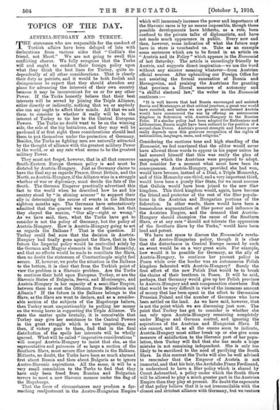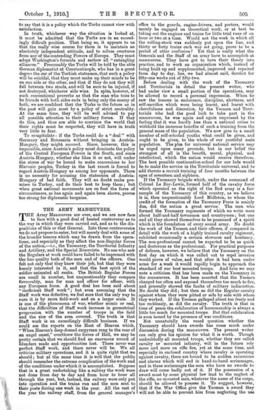TOPICS OF THE DAY.
AUSTRIA-HUNGARY AND TURKEY.
THTstatesmen who are responsible for the conduct of re urkish affairs have been deluged of late with declarations from various sides that " Codlin's the friend, not Short." We are not going to swell this conflicting chorus. We fully recognise that the Turks will and ought to conduct their foreign policy upon what they think the best lines for Turkey, quite in- dependently of all other considerations. That is clearly their duty as patriots, and it would be both foolish and disingenuous to expect that they should abandon any plans for advancing the interests of their own country because it may be inconvenient for us or for any other Power. If the Turks honestly believe that their best interests will be served by joining the Triple Alliance, either directly or indirectly, nothing that we or anybody else can say ought to affect their minds. All that we ask them to consider is whether it really will be to the interest of Turkey to tie her to the Central European Powers. The Turks no doubt want to be on the winning side, the side of the big battalions, and they may well be pardoned if at first sight these considerations should lead them to put themselves under the protection of Germany. Besides, the Turks as fighting men are naturally attracted by the thought of affiance with the greatest military Power in the world, or at any rate what seems to be the greatest military Power.
They must not forget, however, that in all that concerns South-Eastern Europe German policy is and must be dictated by Austria-Hungary. Just as Germany claims to have the final say as regards France, Great Britain, and the North, so Austria-Hungary, if the Alliance wins in a straggle whether of war or diplomacy, must decide the fate of the South. The German Emperor practically advertised this fact to the world when he described how he and his country stood by " in shining armour " to support their ally in determining the course of events in the Balkans eighteen months ago. The Germans have ostentatiously admitted that the quarrel was none of theirs, but that they obeyed the maxim, " Our ally—right or wrong." As we have said, then, what the Turks have got to consider is not the policy of Germany, but the policy of Austria-Hungary. How is Austria-Hungary going to act as regards the Balkans ? That is the question. If Turkey could feel sure that the decision in Austria- Hungary had finally gone against the Slays, that in the future the Imperial policy would be controlled solely by the German and Magyar elements in the Dual Monarchy, and that no efforts would be made to conciliate the Slays, then no doubt the statesmen of Constantinople might feel secure. If, however, we probe the situation in the Balkans to the bottom, it is clear that from the Turkish point of view the problem is a Slavonic problem. Are the Turks to continue their hold upon European Turkey, or are the Slavonic States of Bulgaria, Servia, and Montenegro, and Austria-Hungary in her capacity of a semi-Slav Empire, between them to oust the Ottoman from Macedonia and Albania ? If the future in the Balkans belongs to the Slays, as the Slays are wont to declare, and as a consider- able section of the subjects of the Hapsburgs believe, then Turkey must unquestionably be putting her money on the wrong horse in supporting the Triple Alliance To state the matter quite brutally, it is conceivable that Turkey may give her assistance to the Central Powers in the great struggle which is now impending, and then, if victory goes to them, find that in the final distribution of the spoils her interests will be wholly ignored. What will be called " imperative considerations will compel Austria-Hungary to insist that she, as the representative and patroness of so large a section of the Southern Slays, must secure Slav interests in the Balkans. Hitherto, no doubt, the Turks have been so much alarmed first about Russia and then about Bulgaria as to ignore Austro-Slavonic aspirations. All the same, it will be a very small consolation to the Turks to find that they have only been freed from Russian and Bulgarian terrors to meet a new Slavonic menace under the flag of the Hapsburgs. That the force of circumstances may produce a far- reaching readjustment in the Austro-Hungarian Empire which will immensely increase the power and importance of the Slavonic races is by no means impossible, though these possible developments have hitherto, as a, rule, been confined to the private talks of diplomatists, and have not made much appearance in public. Every now and then, however, some indication of what the future may have in store is vouchsafed us. Take as an example some sentences which are to be found in an article on " Austria and its Policy " which appears in the Economist of last Saturday. The article is exceedingly friendly to Austria, and suggests direct inspiration—we use the word without any sinister meaning whatever—from Austrian official sources. After upbraiding our Foreign Office for not assisting the formal annexation of Bosnia and Herzegovina, and praising the Austrians for granting that province a liberal measure of autonomy and "a skilful electoral law," the writer in the Economist continues :- "It is well known that had Russia encouraged and assisted Servia and Montenegro at that critical juncture, a great war would have resulted, and unless we are gravely misinformed Austria would have commenced the war by offering an autonomous kingdom in federation with Austria-Hungary to the Russian Poles. If a similar policy had been adopted for Ruthenians and Lithuanians, Russia might have been reduced to the position of second-class Power. Austria's present strength and future power really depends upon this generous recognition of the rights of nationalities, languages, races, and religions."
Considering the cautious tone and high standing of the Economist, we feel convinced that the editor -would never have allowed these words to appear in his paper unless he had assured himself that this was really the plan of campaign which the Austrians were prepared to adopt. But consider for a moment what must have been its consequences. Austria-Hungary, provided she had won, would have become, instead of a Dual, a Triple Monarchy, and of this Monarchy one-third, and a. very important third, would have been a purely Slav State, for we must assume that Galicia would have been joined to the new Slav kingdom. This third kingdom would, again, have become the friend and protector of the rest of the Slav popula- tions in the Austrian and Hungarian portions of the federation. In other words, there would have been a tremendous augmentation of Slav power and influence in the Austrian Empire, and the demand that Austria- Hungary should champion the cause of the Southern Slays, or at any rate " should not tolerate the oppression of the Southern Slays by the Turks," would have been loud and potent. We have not space to discuss the Economist's revela- tion of Austro-Hungarian policy, though it is clear that the disturbance in Central Europe caused by such an event would be on a very great scale. For example, how would it be possible for Germany, as the ally of Austria-Hungary, to continue her present policy in Posen while over the border was an autonomous Polish kingdom federated with Austria-Hungary? Surely the first effort of the new Polish Diet would be to break the chains of their brethren in Posen. It will be said, perhaps, that Germany would give up her Polish province to Austria-Hungary and seek compensation elsewhere But that would be very difficult in view of the immense amount of money that has been spent in the effort to Germanise Prussian Poland and the number of Germans who have been settled on the land. As we have said, however, that is not the point which we are discussing just now. The point that Turkey has got to consider is whether she can rely upon Austria-Hungary remaining completely under Magyar and German control, and ignoring the aspirations of the Austrian and Hungarian Slave. If she cannot, and if, as all the omens seem to indicate, Austria-Hungary must either break up or else give some measure of satisfaction to the Slavonic part of her popu- lation, then Turkey will find that she has made a huge mistake in not remaining independent. She is only too likely to be sacrificed to the need of pacifying the South Slave. In this context the Turks will also be well advised to remember that the Emperor of Austria is not immortal, and that his heir, the Archduke Franz Ferdinand, is understood to have a Slav policy which is shared by Count Aehrenthal, a policy under which the South Slays will be allowed to play a much greater part in the Austrian Empire than they play at present. No doubt the exponents of that policy believe that it is not irreconcilable with the closest and strictest alliance with Germany, but we venture to say that it is a policy which the Turks cannot view with satisfaction.
In truth, whichever way the situation is looked at, it must be admitted that the Turks are in an exceed- ingly difficult position. That being so, it appears to us that the really wise course for them is to maintain an absolutely independent attitude, and to refuse overtures from any of the contending Powers of Europe. They must adopt Washington's formula and eschew all " entangling alliances." Presumably the Turks will be told by the able German diplomatist at Constantinople, who has in a great degree the ear of the Turkish statesmen, that such a policy will be suicidal, that they must make up their minds to be on one side or the other, and that if they do not they will fall between two stools, and will be sure to be injured, if not destroyed, whichever side wins. In spite, however, of such conventional proverbs as that the man who tries to be friends with both sides ends in being only the enemy of both, we are confident that the Turks in the future as in the past will gain most by a policy of strict neutrality. At the same time, they will be well advised to pay all possible attention to their military forces. If they do this, and thus are able to convince the world that their rights must be respected, they will have in truth very little to fear.
To recapitulate : if the Turks could do a " deal " with Germany and Roumania without bringing in Austria- Hungary, they might succeed. Since, however, this is impossible, since Austria's policy must dominate the policy of the Central European Powers in the South, and since Austria-Hungary, whether she likes it or not, will under the stress of war be bound to make concessions to her Slavonic peoples, Turkey in the last resort is forced to regard. Austria-Hungary as among her opponents. There is no necessity for accusing the statesmen of Austria- Hungary of bad faith. They will no doubt make pro- mises to Turkey, and do their best to keep them ; but when great national movements are on foot the force of circumstances, as has again and again been shown, proves too strong for diplomatic bargains.



























































 Previous page
Previous page